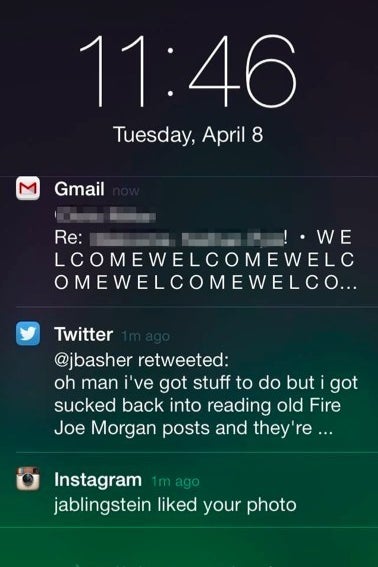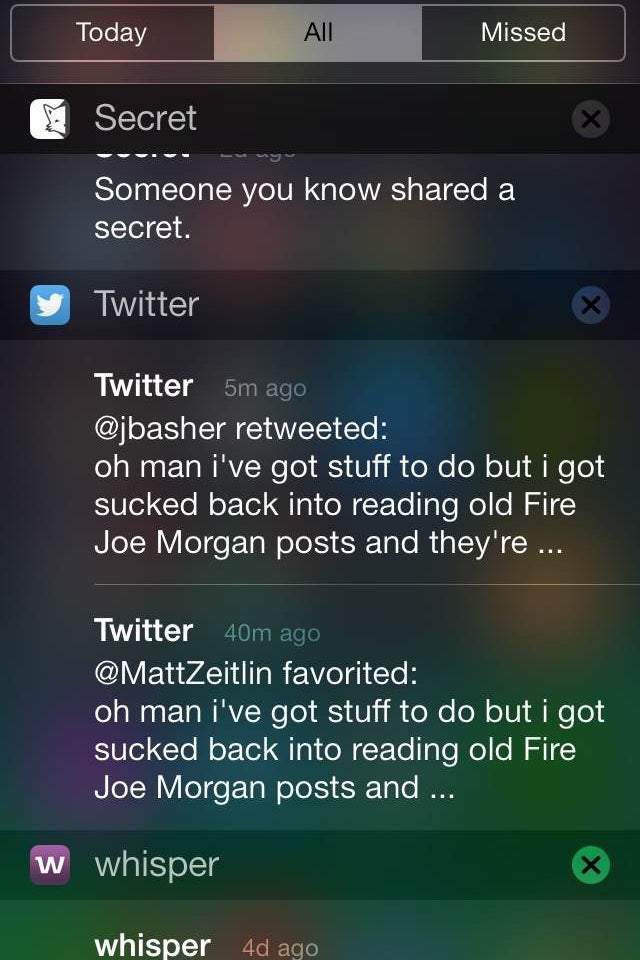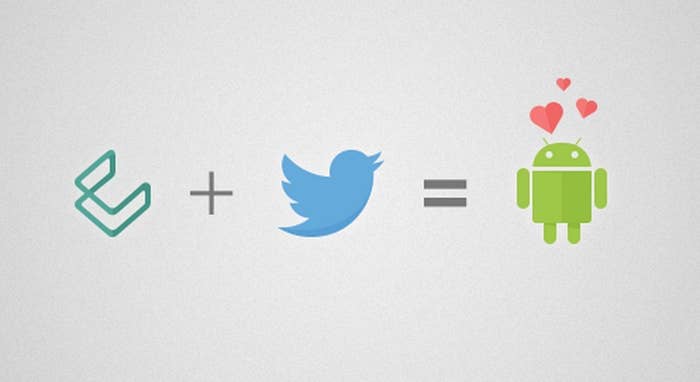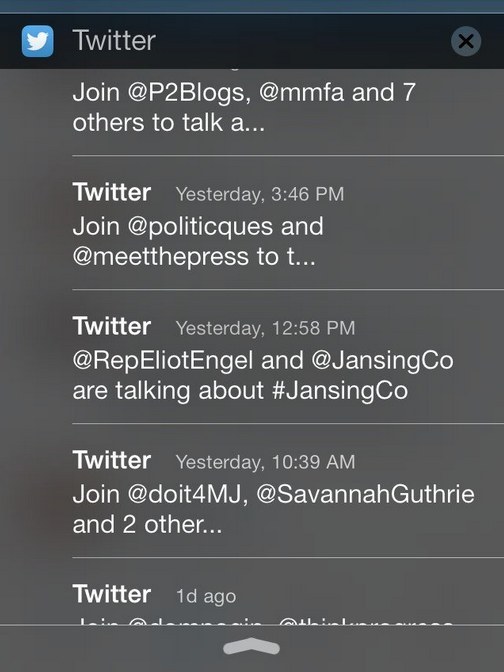

The lock screen and Notification Center are the new homescreen.
If you want an idea of how intense the inter-app fighting has grown in "the battle to become your next homescreen," look no further than Twitter's recent acquisition of Cover, a context-based Android lock screen replacement that reorganizes your lock screen apps based on usage, location, and time of day. But first, let's back up a bit.
Every day we're assaulted by feeds. If you're a heavy mobile phone user, chances are you come into frequent contact with streams of message notifications, comment notifications, calendar updates, weather alerts, score notifications, and app update reminders. Email is perhaps the most pernicious of all the feeds. For better or worse, this onslaught of feeds is the primary way a lot of us are navigating the internet. Recent data backs this up too. The mobile web is being quickly cannibalized by apps.
As John Herrman wrote earlier this year for BuzzFeed, this shift has created a "de-emphasis of the homescreen," causing apps to beg for your attention in an unprecedented fashion. "It's not enough to own the most popular channel when all the channels are so similar — there is a sense, I think, that the channel that wins will be the channel that feels most like home," he wrote.
This January, MG Siegler noted that the first app you open each morning is pretty much "the new homepage." Siegler is right that this is perhaps the most coveted behavior for app developers, but I think the behavior that he describes is changing, albeit subtly. One year ago, Twitter would have almost always been the first app I opened each morning but lately a new habit has emerged.
Now, after turning off my alarm every morning my first stop is now my lock screen, where I can quickly scroll through and in seconds get a quick overview of everything that happened over night, including emails, relevant @replies, and push notifications from news apps. From there, I can right swipe and head to the app that most effectively grabbed my attention. Twitter is still arguably the most used app on my phone, but it's no longer my default homescreen app.
Imagine for a moment "the perfect feed." Ideally, it would be some amalgamation of your current feeds, an aggregated collection of updates that act as small gateways to the rest of the web and your app ecosystem. One feed to rule them all. In many ways, this is what the lock screen has become. It's part of the continual move to push content and news further from your apps, past your home screen and directly into your face.
Which brings us back to Cover. It's just one of many interesting context-oriented apps designed to learn your behaviors and use them to pull one thing out of a crowded app ecosystem and show it to you at the perfect moment. In short, it's a seamless way to sidestep the battle that's being waged on your lock screen. And Twitter is hoping it can be its secret weapon.

There are a lot of possible reasons for the acquisition. Talent is one. Twitter might be gearing up to focus more on Android, or it might be part of a dauntingly ambitious project to own your lock screen and thereby control your homescreen. It's probably some combination of all three. Perhaps more than anything else though, it's an indication of just how far the notification battle for attention has come.
Almost every feature, notification, and email from Twitter is geared toward reminding the casual user that Twitter exists and goading that person toward engaging with others on the service. MagicRecs notifies users when multiple followers engage with or tweet about a particular subject. The network has also begun experimenting with push notifications centered around conversations about specific TV shows as well as alerts that even invite (or command, depending on your interpretation) users to "join" a specific conversation.

These notifications, like Cover, are centered around context. Social networks move fast, especially Twitter. It's no longer enough to send out a daily email or let you know that somebody favorited your retweet. Instead, reminders will need to become increasingly contextual. For instance, why serve up push notifications about a TV show if you're on the West Coast and it's not on for another three hours?
Imagine a Twitter that knows when and where you're most likely to tweet, knows what you like to tweet about, and is able to provide real entryways into conversations that you actually care about. @RandomUser often tweets about politics in the morning but at night is far more likely to tweet about TV, especially on Sundays at 9 p.m. when Game of Thrones is on and @RandomUser is in the Eastern Time Zone. It's a Twitter that doesn't just know who you're following; it's a Twitter that has some understanding of your identity. That might sound invasive to casual users, but for corporations, it's an enticing prospect for cutting through the noise.
Twitter isn't alone here. Context-based apps and software are poised to play an integral role in the internet of the future — a future that will be predominantly mobile and not all that interested in basic "desktop-style" web browsing behaviors. It's why Apple acquired the smart assistant company Cue for $40 million last October and why Yahoo acquired the contextual home screen replacement app, Aviate this past January.
Elsewhere, Google is pouring resources into the context-based search and personal assistant tool Google Now. Even products like Google Maps are being reimagined as highly contextual, and personal versions of Google. These tools index your surrounding environments rather than the web, and the results, more often than not, translate into very real actionable information. But more importantly, they serve as a tool to connect your life in the physical world with the one you can keep in your pocket. And that keeps people coming back.
It's unclear what exactly will become of Cover after its integration with Twitter, but that misses the larger point. Twitter's acquisition today is many things: It's a talent acquisition and an effort to redirect efforts toward Android. It's also a tacit admission that we've reached a point where the means by which the service is exposed is as important as the service itself.
